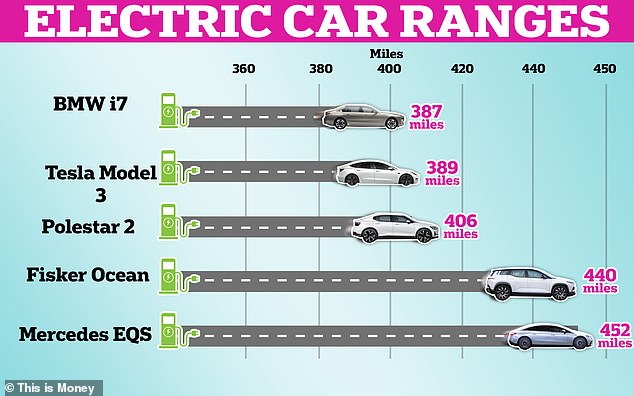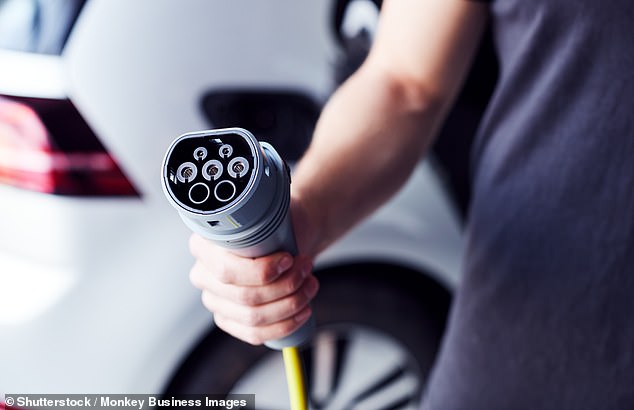How to calculate how economical an electric car is: We explain what kilometers per kWh are and how to calculate this
- How EV Fuel Efficiency and What is ‘Good’ EV Efficiency? Miles/kWh Explained
There’s one number every cost-conscious motorist wants to know about their car: miles per gallon (MPG).
This value, which measures a vehicle’s fuel economy, allows drivers to know how many miles their car can travel per gallon of fuel (gasoline or diesel).
Most people choose models that offer the highest fuel economy possible, as this keeps running costs down and reduces the number of times they have to fill up.
Research by Carwow has shown that almost four out of five (78 percent) people have no idea how to calculate kilometers per kWh for an electric car. This is becoming a crucial figure to understand as the switch to electric cars becomes more widespread.
But as the country’s car population gradually switches to electric vehicles (there are now more than a million on Britain’s roads), MPG is becoming less and less relevant as a new figure emerges: miles per kWh.
So, what is miles/kWh and how do we calculate it? Here’s our guide to calculating how efficient an EV is.
Is miles/kWh important to know?
Research by Carwow shows that 31 percent of British drivers are considering an electric car as their next vehicle, but two-thirds of them admit they don’t know how economical an electric car is.
And almost four out of five have no idea how to calculate the number of kilometers per kWh for an electric car.
How do you calculate miles/kWh?
The specification information for every electric car you buy will state the battery capacity in kWh and the range.
The amount of energy stored in the cells of an electric car is measured in kilowatt hours.
kWh:
Like the size of an engine, the size of the battery varies from EV to EV. For example, a Vauxhall Corsa Electric has a 48kWh battery, while a larger SUV like a BMW iX can have almost double that – 105kWh.
The kWh figure is a ‘net’ capacity figure, because manufacturers keep some battery power in reserve to protect the cells. So make sure you use this figure for your calculation and not the ‘gross’ figure.
Range:
The range in the specifications is usually indicated by the letters WLTP (World Harmonised Light Vehicle Test Procedure). This stands for the realistic range test that all new electric vehicles must pass.
Usually there is more than one listed, so use the ‘combined’ series.
Calculation: Divide the combined range by the usable (net) battery size to get the miles/kWh of your EV

There are many cars today with very long ranges, but to calculate the kilometers per kWh or fuel consumption of your electric car, you need to calculate the range based on the size of the car’s battery.
What is a ‘good’ mileage/kWh for an electric car?
Ian Reid of Carwow says: ‘Electric vehicles are becoming increasingly efficient as battery technology improves, meaning higher mileage per kWh.
‘Lighter electric cars can achieve more kilometers per kWh because the engines do not have to work as hard.
For miles/kWh: Divide the combined range by the usable (net) battery size to get your EV’s miles/kWh
‘However, larger electric vehicles often have more batteries and therefore have a greater range.’
In general, most new electric cars can do more than 4 miles per hour (6.4 km/kWh), so that should be your benchmark. But expect older, heavier large SUVs like a Mercedes EQC to only do 2.9 miles per hour (4.6 km/kWh).
Currently, the Tesla Model 3 is the most efficient electric car in Carwow’s catalog, with a range of 8.25 kilometers per kWh.
Compared to a smaller, lighter Fiat 500e with a fuel consumption of 4.95 miles per kWh, the Model 3 performs particularly well.

To get the most out of your electric car, you can adapt your driving style: avoid sudden braking or acceleration and use the car’s regenerative braking mode.
How can you improve the number of kilometers per kWh of an electric car?
Maximizing miles per kWh with an electric car is similar to exploiting the MPG of a gasoline or diesel car: it comes down to how economically you drive.
Reid advises adjusting your driving style to get the most out of your miles: ‘Hard acceleration and hard braking will affect the battery range, so try to drive more smoothly and anticipate the road ahead.
‘Also choose the regenerative braking program, so that the energy you use is not lost when you brake.’
Regenerative braking captures energy normally lost during braking and uses it to charge the vehicle’s battery.
Another tip is to choose a more economical route: navigation apps like Google Maps offer an ‘Eco’ option. This option may take a few minutes longer, but the routes are shorter and you drive at a lower speed.
“The extra time could be made up for by not having to stop for charging,” Reid said.

